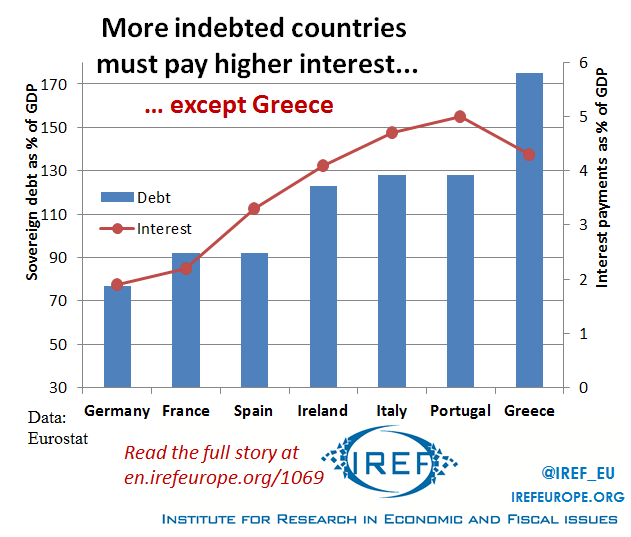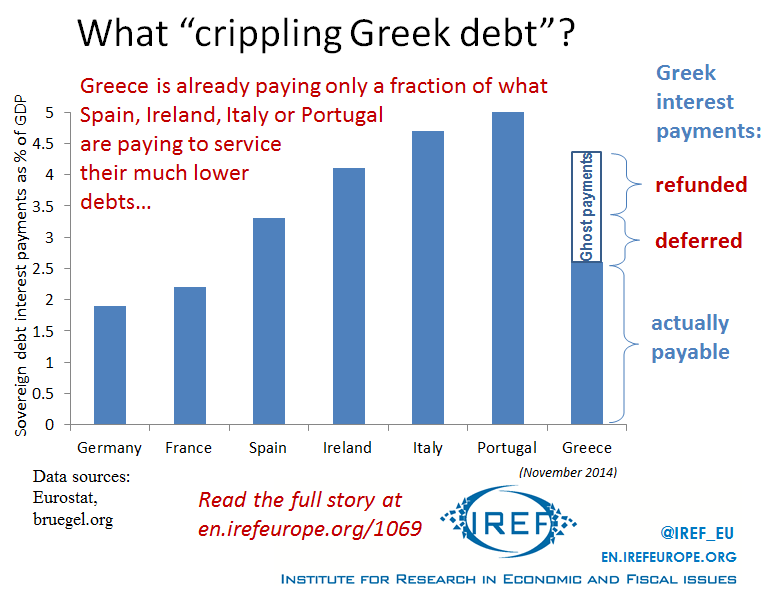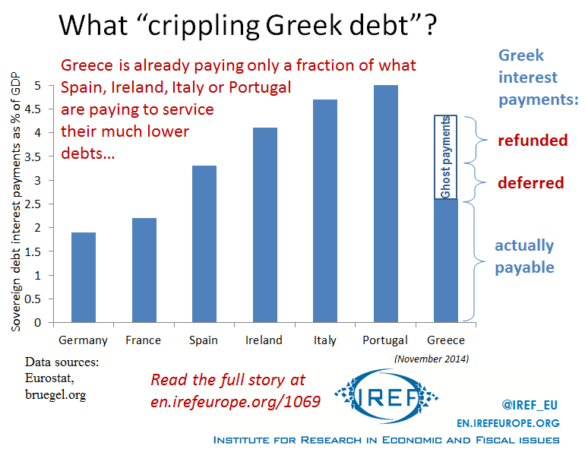Greece is said to be suffering under crippling burden of debt servicing. However, the official debt servicing is already lower than in other EU countries with much smaller debts. Furthermore, the actual interest payments payable by Greece are close to those that Germany is having to make on its incomparably healthier debt. When the general public learn about these relations, political support for any renegotiation of Greek debt is likely to fall even further.
Greek debt is big. At 175% of GDP it is still not as big as Japan’s 244%, but it’s by far the largest in the EU and a far cry from the once-valid but long-forgotten EU ceiling of 60%. Furthermore, Japan is not really an argument since almost a half of her debt is “merely” owed by one government department to another, and the Japanese “want” the high debt to park their high savings rate in.
Under normal circumstances, large government debts generally imply large annual debt repayments for at least two reasons.
• A greater overall debt outstanding multiplied by a given interest rate gives a greater sum repayable
• As debt was growing in the past, lenders were generally not prepared to lend at a “given” interest rate and additional loans were made at a higher interest rate to cover increased risk of non-repayment. So the average interest rate on a higher debt is higher, producing higher still annual debt repayments.
It is often argued that these large debt service payments are crippling the indebted countries’ budgets and making the ultimate debt repayment impossible. In Greece, such rhetoric has clearly won the day, and the election.
Is it true, that heavily indebted EU countries suffer from higher interest payments? Does Greece?
The fat Greek interest bill
At first blush and using merely the official statistics on debt and interest payments, it would appear so. EU countries with higher debt also have to make higher interest payments. (Both debt and debt servicing are expressed as % of GDP below to make them comparable.)

The relationship is not perfect, of course, since financial markets also take other factors into consideration when pricing debt, such as “credit history”, just like for individuals. This may explain, for example, why Spain pays higher interest for the same relative debt as France, or why Portugal pays more than Italy although their relative debts are the same.
Already we see that Greece is “enjoying” a below-par interest payments on its large debt. It is lower than the interest payments in both Portugal and Italy who have less than ¾ of its relative debt.
Still, the 4.3% headline Greek interest servicing costs would at least make realistic the election promise of one Alexis Tsipras to fight to negotiate their reduction to 2%. Appealing enough to have won him the recent election.
However, closer scrutiny of the Greek debt reveals that the country is already paying something very close to only 2% to service its debt.
The REAL Greek interest payments are actually very slim
Greek government owes its debt to three main groups of creditors:
1. the financial markets (and through them often to physical persons),
2. the European Central Bank and other, national central banks
3. the European Financial Stability Facility (EFSF), a temporary crisis resolution mechanism in the Eurozone
Regular interest payments have to be made to the first group. Payments to the second group also have to be made on time, technically speaking, but as long as Greece sticks to the conditions of the bail-out package, they are immediately refunded back to Greece!
Interest payments to the third group are deferred altogether…
So Greece essentially only has to service its debt to private creditors! And there is not much of that debt left, after several rounds in recent years of Greek debt “shaving”, a euphemism for default. Prof. Darvas of the Brussels-based think-tank Bruegel has calculated the burden of actual interest payments Greece has to make. How does it compare to the burden in countries that would have to bear the costs of any Greek “renegotiations”?

When interest payments refunded and deferred are subtracted from the headline figure, Greece already has to pay not 4.3% but less than 2.6%. The actual figure is even lower since central banks refund not only the interest payments, but also capital gains they make on Greek bonds purchased below face value; the latter have not been subtracted in the present calculations.
What this means for renegotiations
The new Greek government is hoping to renegotiate the terms of its debt and debt repayments. These calculations have three main implications for these renegotiations.
1. Tsipras’s goal of debt servicing below 2% will in all likelihood be reached this year even without renegotiations. The calculated figure of less than 2.6% is based on last year’s data and this year the interest rates are even lower. Unless, of course, Tsipras reneges on the bailout conditions, at which point the central banks refunds would stop and actual interest payments would increase.
2. Any debt forgiveness or write-off will ultimately have to be borne by the creditors, including taxpayers in other European countries. General democratic support for renegotiations may be difficult to reach in countries like Spain and others who are having to make much larger debt payments on a debt half the size of the Greek one.
3. Spain is very much a case in point. EU authorities are now looking with a worried eye at the country where the popular Podemos movement is gaining support to explicitly pursue the “Greek route” and fight against its creditors. Or, as they put it, against Angela Merkel.
It is quite possible that the Greek debt is essentially unrepayable even with all the concessions it is getting and the situation will unravel even without further “voluntary” renegotiations. It is clear, however, that the wedge between rules applicable to different countries is only encouraging more countries to join the rhetoric of the Greek communists.





